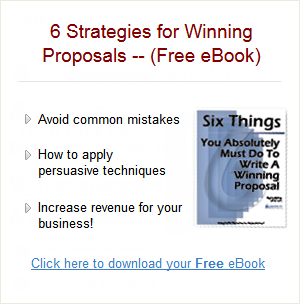Conduct a Lessons-Learned Session
Everybody I have ever talked to agrees that it’s important to do a lessons learned exercise after a proposal. Hardly anybody ever does. “No time right now,” they say. “Too busy,” they say. “We’ll get to it later,” they say. And they don’t. And guess what? They go out and make the same mistakes on the next proposal.
I know doing a lessons learned exercise is easier said than done; I have to kick myself in gear sometimes to make room for it in my schedule. But a lessons learned session–a postmortem–is a key element of the proposal project for one simple reason; it helps you write better ones in the future.
| Are you insane? Here’s a good definition of insanity:
Doing the same thing over and over again and expecting different results. Lessons-learned sessions can reduce (but not eliminate) the insanity that goes with preparing proposals. |
I suggest you take one hour, tops, as soon after a proposal is completed as possible. In this session you look at the proposal itself–how it’s laid out, how well it sends the message, how easy it is to read. Plus, you should analyze the proposal preparation process you went through to identify what worked well, and what you need to improve on.
Who should attend? Not everyone involved with the proposal need attend the session. But the proposal manager needs to be there, and anyone else who played a major role in preparing the proposal. If you had a graphics developer involved, he or she should attend to comment on how well that part of the job went. Whoever wrote the management section ought to attend.
You may also want to invite key subs if you intend to use them in future proposals; you’ll want them to learn how to be more efficient as well.
The session should last no more than an hour. The following are some questions you can ask.
The Proposal Document
- Does the proposal look attractive and professional?
- Does it reflect the image you want your company to convey to your clients?
- Does the proposal present a clear, consistent, and integrated technical, management, and cost plan?
- Is the proposal persuasive? Does it successfully sell your ideas? Are themes emphasized clearly? Are all the claims substantiated?
- Is the proposal easy to read? Is the writing style consistent throughout? Did you use graphics effectively?
The Proposal Process
- What level of pre-solicitation client contact did we have?
- Did you influence the solicitation in any way (scope of work, client’s project approach, evaluation criteria, etc.)? How?
- Was the proposal leader named before or after the solicitation was received? If after, why?
- Was the proposal leader and the Project Manager the same person? If no, why not?
- Was a competitor analysis complete before we prepared the proposal? If no, why not?
- Did we assemble the project team before the solicitation arrived? If no, why not?
- Did we prepare a proposal budget before writing the proposal? If no, why not?
- Did we identify and inform internal staff who would work on the proposal before the solicitation arrived? If no, why not?
- Did we conduct a win strategy session? If no, why not?
- Did we identify major themes to weave throughout the proposal and make all the writers aware of them? If no, why not?
- Did we have a Red Team review? If no, why not?
- Did the Red Team cite many major deficiencies? If yes, were they addressed and resolved?
- Was the proposal development schedule reasonable and realistic?
- If there were any bottlenecks, what were they, and how could you resolve them in the future?
- Did the team work well together? If no, how can we improve that?
- How effective was communication between team members and proposal management?
- What unexpected problems arose in the proposal preparation process?
- How can you prepare for them in the future?
- What was the total cost of preparing the proposal?
- How could costs have been reduced?
- What worked best during the whole effort?
- What didn’t work so well?
- What can we do to improve the overall process?
These aren’t all the questions, and some won’t apply to every proposal every time. But some will. And you can add more.
The point is, you should be asking questions like this after the proposal leaves your offices. Doing this is a way you can make significant changes—and improvements—to how you write proposals. And you ought to be doing something like this; your competition probably is.

